Our four Safe Public Spaces Mentees are half-way through their projects. This week we are featuring their blog posts about how the projects are going so far. This post is from our team in France. Their projects are supported by SSH donors. If you would like to donate to support the 2016 mentees, we would greatly appreciate it!
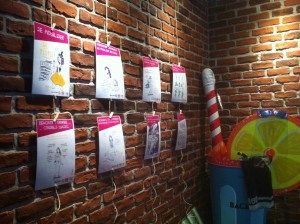
Street harassment wasn’t a word we used to hear in France a few years ago. To draw a really rough sketch, women often talked about “oafishes” between themselves, mostly making it funny stories. Men never got to sense the extent of the issue.
Then Sofie Peeters shot a shocking film in the streets of Brussels, “Femmes de la Rue” (“Women of the Street”, 2012), showing how she was constantly, repeatedly and heavily harassed in the street, whether it was stares, whistles, names or insults. The media started to talk about it, and it’s like women realized they weren’t alone and had the right to speak up.
It had to be extreme to make us realize that it was truly something happening to a lot of – if not every – women, in a vast variety of situations, context and ways. We also connected the dots and got to fully see that it was happening to many people presenting a difference to society’s “normality”, such as LGBQ-identified people, trans*, fat people, persons with mental disabilities, and the list could go on and on and on.
“Stop Harcèlement de Rue” (“Stop Street Harassment”) started in Paris in March 2014, and then spread across France. The local section of Lyon emerged 6 months later, and we started with no means to raise awareness among people. One of the best tools to use against street harassment has been the Internet and the mainstream culture it carries. For example, Thomas Mathieu has his Tumblr “Projet Crocodiles” (“Crocodile Project”), where he uses real situations that women send to him, often about street harassment, and transforms them into comic strips with men represented as crocodiles of the urban jungle. It became very popular. Other cartoonists started to talk about the subject, like Diglee in her blog. It was like we – the civil society, artists, people – had taken the “red pill” (cf. Matrix) and it was just impossible not to see it and impossible to go back.
We decided that we had to take these drawings to the streets and to the schools, to make people think about the issue through them, especially young people, and to hopefully deeply change the way many people are treated in our common public spaces. So we asked Thomas Mathieu and Diglee for their permission. They were very happy to give us the use of their work. We turned to our Facebook and Twitter followers, our friends and family, and ultimately many people have supported us as we’ve collected the money needed to print the drawings in high quality, large and rigid format, and create a proper exhibition to be shown everywhere.
Stop Street Harassment’s Safe Public Spaces Mentoring Program came at the right time for us, and we got selected, to our great joy. The funding has helped us with the printing costs, too. We’re now midway through our project, and so much already happened, including media coverage of our campaign:
* We tested a first version of the exhibition in a bar on the 3rd of September, and we got a lot of positive feedback, plus some institutions got in contact with us to have it shown at their locations.
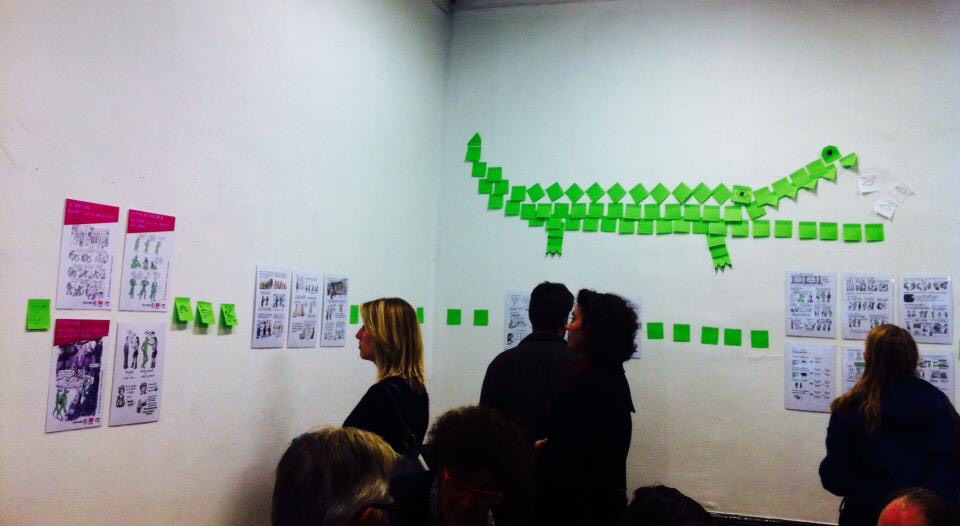 At the “Clochards Célestes” theater
At the “Clochards Célestes” theater
* We presented the exhibition on an “equality boat” lent by the region Rhône-Alpes during two evenings, the 1st and 2nd of October, in the presence of the cartoonists and as an introduction to debates. People participated a lot and the exchanges were great.
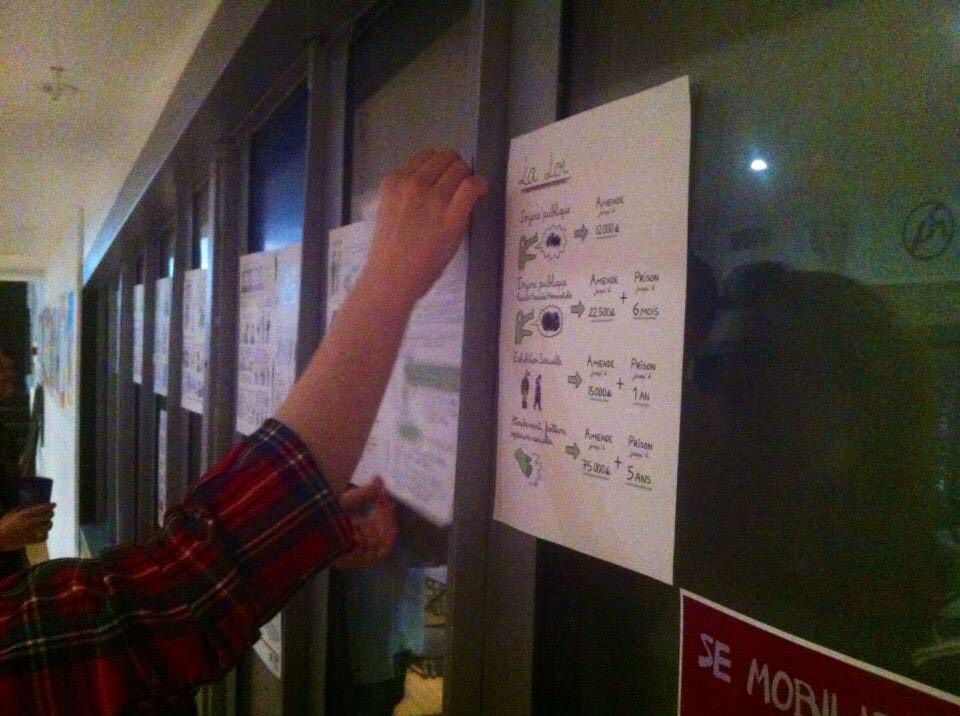
On the Région Rhône-Alpes’ “equality boat” navigating on the Rhône
* We worked with the town of Grenoble to present the exhibition during a week in the streets, in a really huge size, from the 7th to 13th of October. A lot of people saw it and stopped by, and we got a lot of good comments, both from the town officers and the public.
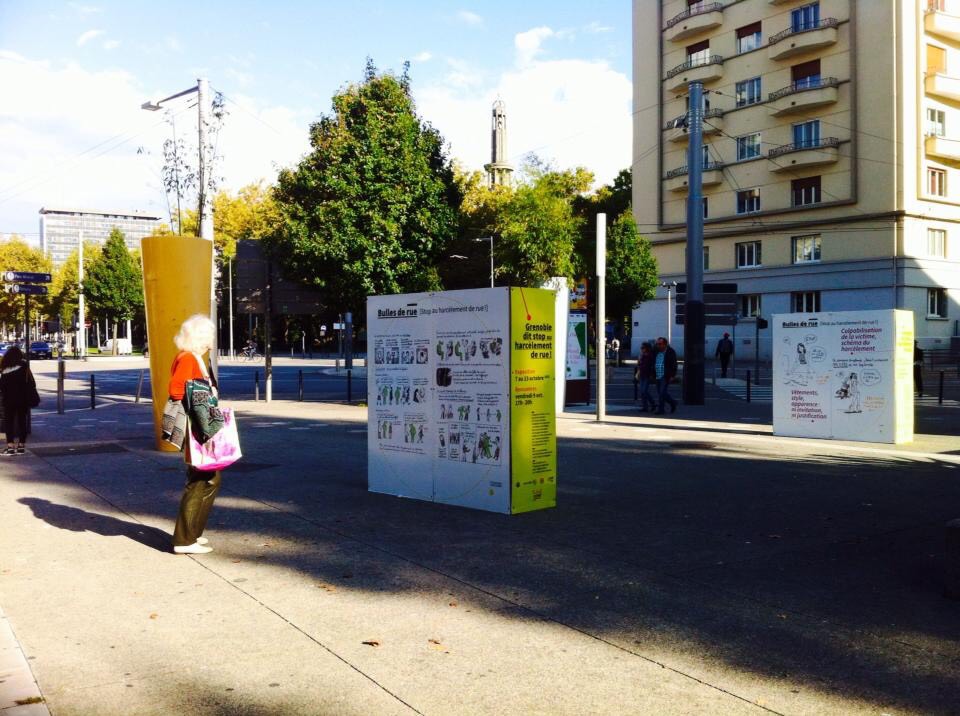 On Valentin Huïy’s place in Grenoble. Oct. 2015
On Valentin Huïy’s place in Grenoble. Oct. 2015
* We took our exhibition to a high school for our very first school intervention. It was there for a week, from the 12th to 16th or October. The students were very interested and so was the teaching team. It was a success.
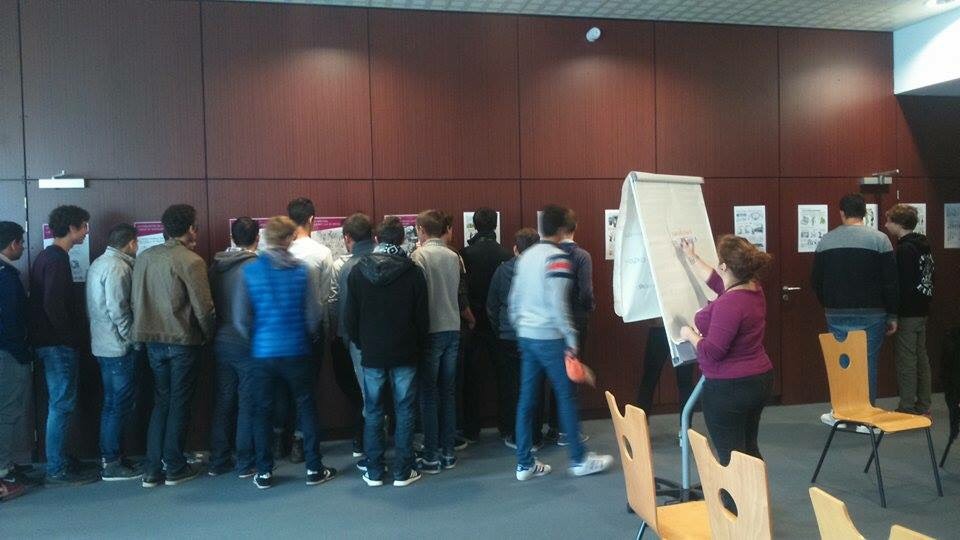 Neuville-sur-Saône high-school, exhibition and workshop
Neuville-sur-Saône high-school, exhibition and workshop
We’re now looking forward to adding drawings and texts to our first version, to send the final one to the printer! It’s a long job, but we’ve already been rewarded for it, so it is just a matter of time. 2016 will see a beautiful new tool to fight street harassment, first in Lyon and Rhône-Alpes, and then through France entirely.
Anne Favier is the co-founder of Stop Harcèlement de Rue in Lyon, France.
